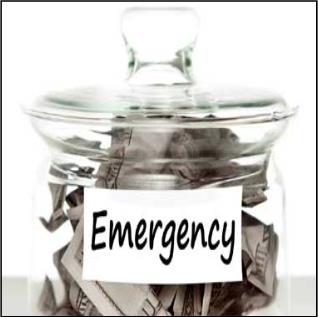By John C. Fales
Sometimes it’s hard to tell your spouse they’re spending too much money, to tell your friends you need to skip the annual trip this year, or to tell your child their new car needs to be a joint investment rather than a gift. However, wouldn’t it be easier to have a crucial conversation today rather than a really challenging one later that starts with, “We have a big financial problem”?
According to a recent poll, two-thirds of Americans would have difficulty coming up with the money to cover a $1,000 emergency. The hardship isn’t just found in households with low income; these percentages show how many households in three income levels couldn’t cover this emergency:
- 75% of households making less than $50,000
- 67% of households making$50,000-$100,000
- 38% of households making $100,000+
Getting caught in the debt spiral can occur faster than you’d think. Since life is full of unexpected (often expensive) surprises, it is a wise idea to have some money saved for those unexpected events. At a minimum, having three months’ worth of living expenses is recommended, but six months would be more sufficient to create an adequate cushion. Are there some things you need to say “no” to today in order to build an emergency fund for the future?
A study from the Urban Institute shows that being a low income household with $2,000 to $4,999 in savings is better than being a middle income household with no savings. Additionally, they found that about 1 in 10 high-income families making over $72,120 a year don’t have any savings, compared with 4 in 10 low-income families and 2 in 10 middle-income families. Families with $5,000 in the bank are considered asset poor as they could only support a family of three at the poverty level for three months.
Remember these spending principles:
- Don’t appropriate all anticipated income. You could also say don’t spend everything you make and you really want to avoid spending more than you make. Fund your savings and investment accounts by factoring them in as a regular monthly payment – to yourself. Try living on 80 percent of your take home pay. By establishing your “emergency fund” you can ensure the money will be available when needed.
- Avoid high-pressure sales situations. Claims of “available today only” or “last one left” may fuel your urge to make a purchase. Walk away from these claims and don’t make the purchase until you’ve thought it through.
- Utilize coupons and discounts. A small amount of effort is all it takes to find deals and make them work for you. If you don’t have to pay full price or can adjust your weekly meal menu or other purchasing toward sale times, do so.
- Make purchases that reflect your values. Trim away the frivolous spending and insignificant purchases that add up over time. If you value maintaining a healthy lifestyle, consider spending on recreational activities and healthy food items rather than excessive visits to buffets and stress-inducing activities.
Sources:
http://www.urban.org/features/why-cities-should-care-about-family-financial-security

